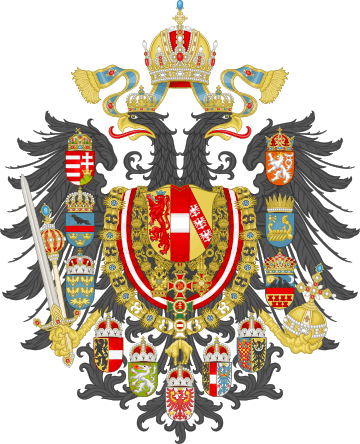Karl von Habsburg
Karl Thomas Robert Maria Franziskus Georg Bahnam von Habsburg (born 11 January 1961), also known as Karl of Austria, is an Austrian politician and the current head of the House of Habsburg-Lorraine, which used to rule the lands of the Holy Roman Empire, the Habsburg Monarchy, the Empire of Austria, the Austro-Hungarian Monarchy, and the Kingdom of Hungary as well as the Crown lands of Bohemia and Croatia by hereditary right until the end of World War I.
Karl von Habsburg | |
|---|---|
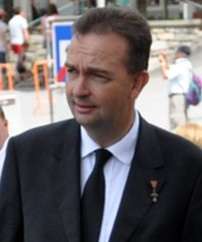 Karl von Habsburg | |
| Member of the European Parliament for Austria | |
| In office 1996–1999 | |
| Majority | 165 |
| Head of the House of Habsburg-Lorraine | |
| Assumed office 1 January 2007 | |
| Preceded by | Otto von Habsburg |
| Personal details | |
| Born | 11 January 1961 Starnberg, Bavaria, West Germany |
| Political party | Austrian People's Party |
| Spouse(s) | |
| Children | Eleonore von Habsburg Ferdinand Zvonimir von Habsburg Gloria von Habsburg |
| Mother | Princess Regina of Saxe-Meiningen |
| Father | Otto, Crown Prince of Austria |
| Austrian Royalty |
| House of Habsburg-Lorraine |
|---|
.svg.png) |
| Francis I (Francis II, Holy Roman Emperor) |
|
| Ferdinand I |
| Franz Joseph I |
|
| Charles I |
|
Karl von Habsburg is known as such in the English-speaking world, but in Hungary he is known as Habsburg Károly, in the Czech Republic as Karel Habsbursko-Lotrinský, in Croatia as Karlo Habsburško-Lotarinški, in Italy as Carlo d'Asburgo-Lorena, in Spain as Carlos de Habsburgo-Lorena and in France as Charles de Habsbourg-Lorraine.
Born in Starnberg, Germany, in 1961, he is the son of Archduke Otto von Habsburg, Crown Prince of Austria and Princess Regina of Saxe-Meiningen, and the grandson of the last Austro-Hungarian emperor, Charles I. He is head and sovereign of the Austrian Order of the Golden Fleece. Habsburg served as a Member of the European Parliament for the Austrian People's Party (1996–1999). He is known for being Pro-European and is also an advocate for the Pan-European movement.
Karl von Habsburg has long been committed to protecting the world's cultural heritage from threats such as armed conflict and natural disasters. Habsburg vigorously advocates international humanitarian law, the right of peoples to self-determination and the protection of ethnic minorities worldwide. He has been President of the cultural protection organization Blue Shield International since 2008.
Early life
Karl von Habsburg was born on 11 January 1961 in Starnberg, Bavaria. He was baptised in Pöcking, Bavaria, as Archduke Karl of Austria (Erzherzog Karl von Österreich), the name entered in the baptismal records.[1] At the time of his birth, his father was de facto stateless and possessed a Spanish diplomatic passport (he had grown up in Spain), while his mother was a German citizen. Like his father and siblings, he was banished from Austria for the first years of his life. However, the administrative court of Austria later ruled that applying to return to the country was legal, and his family was granted visa entrance in June 1966.[2]
He is the oldest grandson of the last Austrian emperor and empress, Charles I and Zita of Bourbon-Parma.
His ancestral titles are Imperial Highness Archduke of Austria, Prince of Hungary, Bohemia, Dalmatia, Croatia, Slavonia, Galicia, Lodomeria, Illyria, and Jerusalem, etc.; Grand Duke of Tuscany and Cracow, Duke of Lorraine, Salzburg, Styria, Carinthia, Carniola and of the Bukovina, Grand Prince of Transylvania, Margrave of Moravia, Duke of Upper and Lower Silesia, of Modena, Parma, Piacenza and Guastalla, of Auschwitz and Zator, of Teschen, Friuli, Ragusa and Zara, Princely Count of Habsburg and Tyrol, of Kyburg, Gorizia and Gradisca, Prince of Trent and Brixen, Margrave of Upper and Lower Lusatia and in Istria, Count of Hohenems, Feldkirch, Bregenz and Sonnenberg, etc.; Lord of Trieste, Cattaro and in the Windic March, Grand Voivode of the Voivodeship of Serbia, etc., etc., etc.[3]
He does not use his ancestor titles, because unlike most European countries, the own use of such titles is not permitted in Hungary and Austria.[4] Habsburg, however, is often referred to and titled as Imperial Highness by inhabitants of Central Europe, especially in Hungary, Austria and Croatia. Karl von Habsburg himself is addressed worldwide (next to his names in for example Italian or Spanish) as Mr. Von Habsburg, Archduke of Austria or even from official organs especially as Imperial Highness. Habsburg himself says: "I don't refer to titles, I'm not that vain. People use these titles out of respect for history and the role of my family in history."[5]
Although the Adelsaufhebungsgesetz abolished all Austrian and Hungarian noble, royal, and imperial titles in 1919[6], and their usage is still illegal in those countries[7], media elsewhere occasionally refer to Karl von Habsburg by his ancestral titles[8][9] of Archduke of Austria, Royal Prince of Hungary, Bohemia and Croatia.[10]
House of Habsburg
In 1961, his father, Otto von Habsburg, renounced all claims to the Austrian throne, as a necessary legal condition to being allowed to return to Austria. On 30 November 2000, Karl's father transferred over to him the position of head and sovereign (grand master) of the Austrian Order of the Golden Fleece. In 2005, Karl von Habsburg filed an unsuccessful lawsuit before Austria's constitutional court after a failed attempt to have former properties of the Habsburg family returned. The family's estates had been expropriated by the First Austrian Republic; this had in part been reverted under Austrofascism, and then the Nazis had expropriated them again.
As ordered personally by Adolf Hitler, Otto von Habsburg's personal property and that of the House of Habsburg were confiscated.[11] Otto von Habsburg, like later his son Karl, was a firm supporter of European integration and was a vehement opponent of National Socialism and Communism.[12][13] Hitler hated the Habsburgs, so much so that his invasion plan of Austria was called "Operation Otto". Hitler diametrically rejected the centuries-old Habsburg principles of "live and let live" with regard to ethnic groups, peoples, minorities, religions, cultures and languages.[14][15] Over 800 Habsburg resistance fighters were executed by the Nazis. Among them was Karl Burian, who was planning to blow up the Gestapo headquarters in Vienna, and Dr. Heinrich Maier, who very successfully sent the locations of Nazi armament factories for V-2 rockets, Tiger tanks or airplanes to the Allies and planned a monarchy for after the war in Central Europe.[16][17][18]
At the express request of the USSR, which feared an opposition in its oppressed countries, the anti-Habsburg laws became mandatory international and constitutional components of the Austrian State Treaty in 1955.[19][20][21] The family tried to get their former property returned under rules for victims of the Nazi regime. The attempt failed because the law of expropriation still has constitutional status.[22] The Habsburg family played a leading role in the fall of the Iron Curtain.[23][24]
On 1 January 2007, his father relinquished his position as the head of the House of Habsburg-Lorraine, a status which then devolved on Karl,[25] and in 2008 he became the grand master of a Habsburg-Lorraine Order of St. George.[26]
Career
Karl von Habsburg did his military service in 1981 as a Platoon commander of a Jäger (infantry) Platoon as a one-year volunteer with the Austrian Armed Forces, where he later also completed his pilot training and is currently the reserve Hauptmann (captain) in the Austrian Air Force. He is also an Austrian Army Cultural Property Protection Officer, first with the staff of the Military Command of Salzburg, later with the Armed Forces High Command, currently with IHSW at Staff College. As a paratrooper, he was elected President of the European Military Paratroopers Association (Europäischen Militär- Fallschirmsprungverbandes e.V.) in 2001 - a role that he still holds today.[27]
Since 1986, Karl von Habsburg has been president of the Austrian branch of the Paneuropean Union, which co-organised the Pan-European Picnic (- an important event during the fall of the Iron Curtain and the Revolutions of 1989). Under his responsibility, the opposition and freedom movements in Central and Eastern Europe were supported and he participated extensively in political events in what was then Czechoslovakia, Hungary, then Yugoslavia and the Baltic States.
In May 1990, Habsburg personally led an aid convoy to Vilnius with food, medicine and clothing as a representative of the Paneuropean Union, in response to the Soviet Union's blockade of raw materials following the proclamation of Lithuanian independence in March 1990. In 1991 he organized international aid against the destruction in Dubrovnik and in the former Yugoslavia.[28]
Karl von Habsburg studied law, political science and philosophy from 1982 at the University of Salzburg and received a scholarship in 1984 for further studies at Michigan State University. He received later an LLM and MBA degree from IMADEC University in Vienna in 2012. Habsburg has been giving lectures on many topics such as European unification, legal philosophy, political and historical developments in Europe and security issues. He speaks English, French, Spanish, Italian and German.
In 1992/1993, he hosted a TV game show with Austrian public TV broadcaster ORF, called Who Is Who.[29][30] In October 1996, he was elected to the European Parliament for the Austrian People's Party (ÖVP). Two years later, it emerged that the ÖVP's election campaign had benefitted from at least 30,000 Mark of World Vision donation money via Paneurope Austria while Karl von Habsburg sat on the board of World Vision Austria, apparently without noticing the director's dubiously legal activities.[31] His father exacerbated the controversy when he complained that his son was being attacked unfairly and drew a parallel between the name "Habsburg" and a yellow badge.[31] ÖVP did not nominate Karl von Habsburg again for the 1999 elections.[29][32] In 2004, Karl von Habsburg paid 37,000 euros to the new World Vision Austria branch.[32]
On 19 January 2002, he was appointed Director General of UNPO (Unrepresented Nations and Peoples Organization) by the UNPO Steering Committee.[33]
Since 7 December 2008, he is the President of the Association of National Committees of the Blue Shield.[34] During this time, he undertook a number of fact finding missions like in Egypt, Libya, Lebanon and Mali.[35][36] Habsburg does not hesitate personally to undertake dangerous operations himself, as Joris Kila, art historian for Blue Shield and "Competence Center for Cultural Heritage" at the University of Vienna, explains: "Unesco and other institutions consider it too dangerous to inspect the places in Libya whether they are damaged or not, so Karl von Habsburg and I decided that we had to do it ourselves, we were in Ras-Almergib, a place right next to Leptis Magna, where a Gaddafi radar and air defense station destroyed was 15 meters from a Roman fortress that remained intact. The ancient site was on our list."[37] Hapsburg was instrumental in creating a "No Strike List" of cultural heritage sites and cultural sites that should be preserved when attacks or flight operations were carried out. This particularly moved NATO troops to protect the cultural assets and the economic and cultural basis of the civilian population.[38]
At a Civil-Military Assessment Mission for Malian Heritage in 2014, extensive "no-strike lists" with cultural goods were created. With a Blue Shield team in cooperation with the Armed Forces in Mali, Von Habsburg checked the cultural assets threatened and any relief measures. In particular, training was given by the Commander of military region 5, Colonel Kèba Sangare, Habsurg for Blue Shield and Siratigui Sogoba performed as a Cultural Heritage specialist. This also involved adapting the combat technique.[39][40]
It is also about preventing the looting of historical cultural sites.[41] Habsburg particularly supports the bringing together of military and civilian personnel and the cooperation of various international organizations for the protection of cultural assets, such as the Blue Shield, UNIFIL and UNESCO deployment in Lebanon in 2019, and the cooperation with the International Committee of the Red Cross in 2020.[42][43][44]
Since 2010 he has been Chairman of the Advisory Board of the Competence Center for Cultural heritage and Cultural Property Protection at the University of Vienna. He delivers lectures and training courses worldwide on the role of the military in protecting cultural property, such as at the United States Africa Command, the Civil-Military Cooperation Centre of Excellence or the Theresian Military Academy.[45][46][47] He emphasises that it is crucial for cultural property protection to be on the spot quickly: "We know the importance to be fast and in a place where there is a potential conflict or an actual conflict; you have to be there really fast to make an assessment and to see what you can do to immediately help."[48]
 ANCBS Fact Finding Mission Egypt, 2011. Karl von Habsburg is on the right
ANCBS Fact Finding Mission Egypt, 2011. Karl von Habsburg is on the right ANCBS Fact Finding mission to Egypt, 2011 - Karl von Habsburg
ANCBS Fact Finding mission to Egypt, 2011 - Karl von Habsburg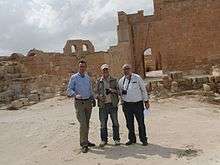 Blue Shield First Assessment Mission to Libya, September 28 to 30, 2011. Karl von Habsburg is on the left, and Hafed Walda on the right.
Blue Shield First Assessment Mission to Libya, September 28 to 30, 2011. Karl von Habsburg is on the left, and Hafed Walda on the right.
Von Habsburg propagates vehemently worldwide through on-site missions, lectures, workshops and interviews on the protection of archaeological finds and archaeological sites, in addition to the establishment of rules, documentation and lists, and the training of the police, the military, civil administration and international organizations, but with particular importance the strong involvement of the local population. It is only through cooperation with the locals that the protection of archaeological finds, exhibits and excavation sites from destruction, looting and robbery can be implemented sustainably. He summed it up with the words: “Without the local community and without the local participants, that would be completely impossible”.[49]
Another of his areas of activity is the protection of intangible cultural heritage such as customs, traditions or languages. Much of what is not hewn out of stone or on paper has to be preserved for the next generations, he says. "Today, on average, we lose one language in the world every six weeks. But 96 percent of the languages we know are more or less at risk. You have to treat them like extinct species."[50]
Since 2009, he has been a shareholder in a media group in the Netherlands, consisting of radio stations, a magazine and a music television channel. He is also one of the three co-founders of BG Privatinvest, a Vienna-based investment company. In December 2010 the company acquired the two most important Bulgarian daily newspapers, Dneven Trud and 24 Chasa.[51] After ongoing conflicts with Bulgarian partners, BG Privatinvest sold the newspapers in April 2011.[52]
As head of the family, Habsburg undertakes numerous commitments. On the one hand, these are cultural, historical, scientific, political, but also tourist events and, on the other hand, commitments to orders of chivalry, associations or military units. Many events, such as the participation in the peace flight in 2018 as a pilot with his plane, concerned the centenary of World War I.[53] In 2019 there were many events in honor of the Holy Roman Emperor Maximilian I.[54] He is supported in this work by an adjutant general or adjutant.[55]
Personal life
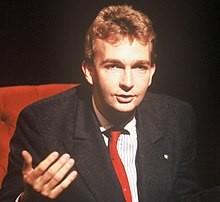
Habsburg has lived in Salzburg, Austria, since 1981, and resides in Casa Austria, formerly called Villa Swoboda, in Anif, near the city of Salzburg.[56] On 31 January 1993 in Mariazell, he married Baroness Francesca Thyssen-Bornemisza (born 7 June 1958 in Lausanne), the only daughter of Baron Hans Heinrich Thyssen-Bornemisza de Kászon, a European industrialist, and his third wife, the fashion model Fiona Frances Elaine Campbell-Walter.[57] The marriage received the dynastic authorization of Karl's father, as head of the House of Habsburg, despite objections from some members of the family inasmuch as the bride, although a baroness in the nobility of pre-republican Hungary and Transylvania, did not descend in the canonically legitimate male line from a family of dynastic (ruling or formerly ruling or mediatised) status,[58][59] as does his younger brother Georg's wife.
In July 1998 an Austrian court fined Karl von Habsburg 180,000 schillings ($14,300); he had failed to declare immediately to customs officials that he had an antique diadem in his luggage when he crossed the border from Switzerland in July 1996.[60] The diadem belonged to his wife who intended to wear it at a wedding ceremony. After 10 years of marriage, the couple separated in 2003.[61]
Karl and Francesca have three children:
- Eleonore Maria del Pilar Iona Christina Jelena (born 28 February 1994 in Salzburg). Married civilly to Jérôme d'Ambrosio on 20 July 2020.
- Ferdinand Zvonimir Maria Balthus Keith Michael Otto Antal Bahnam Leonhard (born 21 June 1997 in Salzburg).
- Gloria Maria Bogdana Paloma Regina Fiona Gabriela (born 15 October 1999 in Salzburg), her godmother is Gloria, Princess of Thurn and Taxis.[62]
Habsburg said in an interview about private life in the 21st century: "If you don't deliver results, you won't get any further. There are no inherited laurels to rest on. And I don't see anyone in my family who has a problem with that." Regarding the racing profession of his son Ferdinand: "I'm pretty relaxed now. When I think about how often I took him to the hospital with broken bones after a kart race!"[63]
In March 2020, during the COVID-19 pandemic, he tested positive for the virus. Habsburg said he felt good and fearless and was self-isolated at home.[64] He was the first royal person and head of a royal house to contract the virus.[65] Habsburg was officially declared healthy after almost three weeks of quarantine. "However, the situation makes it necessary to stay at home. It is the best way to curb the spread of the virus," he said. "One must now bear responsibility in freedom, to take care of ourselves and thus of our fellow human beings".[66] After his illness, Karl von Habsburg encouraged everyone to follow the official protective measures strictly, and asked survivors of the disease to donate blood plasma.[67]
Honours
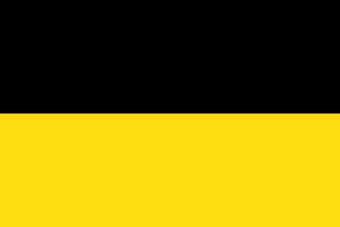

.svg.png)
- Grand Master of the Knighthood of Saint Sebastian in Europe (Ritterschaft vom Heiligen Sebastianus in Europa)[68]
- Leader of many traditional military and rifle associations, (Standschützen)
- Supreme band owner of the "katholisch-österreichischen Landsmannschaften", (Studentenverbindung)[69]
- Protector of the Order of Wine Knights Ordo Equestris Vini Europae[70]
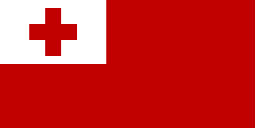

- Knight of the Sacred Military Constantinian Order of Saint George
- Honorary Knight of the Teutonic Order
- Honorary doctor of the Pan-European University
- Medal of honor of the Università Cattolica del Sacro Cuore
- Honorary citizen of numerous communities
His as Grand Master not currently activated Orders of chivalry of his ancestral are the Military Order of Maria Theresa, the Order of Leopold, the Order of the Iron Crown and the Order of Franz Joseph.
Notes
- The family name of Karl von Habsburg's father was declared to be Habsburg-Lothringen by an Austrian ministerial decision in 1957 and by a German court (Landgericht Würzburg) on 16 July 1958. Otto was, however, at the time de facto stateless, living in Germany with a Spanish diplomatic passport, and was denied both entry to Austria and an Austrian passport. Otto's official name as a German citizen from 1978 was Otto von Habsburg.
References
- "Habsburgs Erbe zerfiel und erlebte dennoch eine Renaissance « DiePresse.com". diepresse.com. Retrieved 13 November 2016.
- "House of Habsburg | European dynasty". Encyclopedia Britannica. Retrieved 1 August 2018.
- Franz Gall: Österreichische Wappenkunde. Handbuch der Wappenwissenschaft. (Austrian heraldry. Handbook of coat of arms science - German) Böhlau, Vienna/Cologne/Weimar 1992, ISBN 3-205-05352-4, p 105 f.
- "RIS - Gesamte Rechtsvorschrift für Habsburgergesetz - Bundesrecht konsolidiert, Fassung vom 09.08.2015". bka.gv.at.
- "Ist der Adel passé, Herr Habsburg?". Kronen Zeitung.
- "Law of April 3, 1919, on the referral from the state and the takeover of the assets of the House of Habsburg-Lorraine". Rechtsinformationssystems des Bundes.
- Korom, Philipp; Dronkers, Jaap (2015). "Nobles among the Austrian economic elite in the early twenty-first century" (PDF). Nobilities in Europe in the Twentieth Century: Reconversion Strategies, Memory Culture and Elite Formation. Peeters. pp. 281–304.
- Kaiser Joseph II. harmonische Wahlkapitulation mit allen den vorhergehenden Wahlkapitulationen der vorigen Kaiser und Könige.
- Croatian Coronation Oath of 1916. pp. 2–4. Emperor of Austria, Hungary and Croatia, Slavonia and Dalmatia Apostolic king
- For some examples of this usage, see Burke's Guide to the Royal Family, edited by Hugh Montgomery-Massingberd, published by Burke's Peerage, London, 1973, p. 240. ISBN 0-220-66222-3; Nicolas Enache's La Descendance de Marie-Therese de Habsburg, published by ICC, Paris, 1996. pp. 44, 50; Chantal de Badts de Cugnac and Guy Coutant de Saisseval's Le Petit Gotha, published by Nouvelle Imprimerie Laballery, Paris 2002, pp. 201–202. ISBN 2-9507974-3-1; the Genealogisches Handbuch des Adels, Fürstliche Häuser, Band XVI, published by C.A. Starke Verlag, 2001, pp. 87–90. ISBN 3-79800824-8[fn 1]
- Zoch, Irene (22 February 2004). "Habsburgs demand return of estates seized by Nazis in 1938". The Daily Telegraph. London. Retrieved 6 July 2011.
- Nicholas Kulish (4 July 2011). "Otto von Hapsburg, a Would-Be Monarch, Dies at 98". The New York Times.
- "Habsburg: Last heir to Austro-Hungarian empire dies". BBC News. 4 July 2011. Retrieved 5 July 2011.
- Timothy Snyder "The Red Prince: The Secret Lives of a Habsburg Archduke" (2008); James Longo "Hitler and the Habsburgs: The Fuhrer's Vendetta Against the Austrian Royals" (2018); Bob Carruthers "Hitler's Violent Youth: How Trench Warfare and Street Fighting Moulded Hitler" (2015).
- On Habsburg and the diversity of religions: Pieter M. Judson "The Habsburg Empire. A New History" (Harvard 2016).
- See judgments of the Nazi-Volksgerichtshof GZ 5H 18/44 u. 8 J 203/43.
- Hans Schafranek: Widerstand und Verrat: Gestapospitzel im antifaschistischen Untergrund. Czernin, Vienna 2017, ISBN 978-3-7076-0622-5, p 161–248.
- Elisabeth Boeckl-Klamper, Thomas Mang, Wolfgang Neugebauer: Gestapo-Leitstelle Wien 1938–1945. Edition Steinbauer, Vienna 2018, ISBN 978-3-902494-83-2, p 299–305.
- A Habsburg monarchy or Danube federation, as aimed by the British side, was seen by the Soviet politicians as an instrument of an anti-Soviet policy. (Wolfgang Mueller "Die sowjetische Besatzung in Österreich 1945-1955 und ihre politische Mission" (German - "The Soviet occupation in Austria 1945-1955 and its political mission"), 2005, p 24.
- Gerald Stourzh "Geschichte des Staatsvertrages 1945 - 1955" (1975) p 2.
- Robert J. Gannon "The Cardinal Spellman Story" (1962), p 222-224.
- Karl von Habsburg will Vermögen vor VfGH erkämpfen
Habsburger mit Entschädigungs-Forderung beim VfGH abgeblitzt. - Otmar Lahodynsky: Paneuropäisches Picknick: Die Generalprobe für den Mauerfall (Pan-European picnic: the dress rehearsal for the fall of the Berlin Wall - German), in: Profil 9 August 2014; Thomas Roser: DDR-Massenflucht: Ein Picknick hebt die Welt aus den Angeln (German - Mass exodus of the GDR: A picnic clears the world) in: Die Presse 16 August 2018.
- Miklós Németh in Interview, Austrian TV - ORF "Report", 25 June 2019.
- "Die vielen Pflichten des Adels". Wiener Zeitung (in German). 5 July 2011. Retrieved 11 July 2011.
- "Wiener Schatzkammer: Schatz des Ordens vom Goldenen Vlies". wiener-schatzkammer.at. Retrieved 13 November 2016.
- "Vorstand". www.european-paratrooper.de.
- Hans Haider: Kulturgüterschutz: Karl Habsburg-Lothringen. In: Wiener Zeitung, 29. Juni 2012, Archived on 9 Februar 2020.
- "Beruf: Enkel", Die Presse, 3 April 2011
- Ansichtssache: Ranking der Absonderlichkeiten im ORF, 27 December 2005
- Martin, Hans-Peter (21 December 1998), "Österreich : Gelber Stern", Der Spiegel (52)
- Schüller, Rainer (2005), "25. November 1998: Der Spendenskandal um "World Vision Österreich" bringt den ÖVP-Politiker Karl von Habsburg in Bedrängnis. Volkspartei und Adel: ein schwieriges Verhältnis?", Datum (10), archived from the original on 14 May 2007.
- UNPO. "UNPO Steering Committee appoints Karl von Habsburg as the organizations new Director-General". UNPO Website. Archived from the original on 3 September 2010. Retrieved 23 April 2011. This position is separate from the "Secretary General" as the UNPO Website explains "This is a newly created senior position within the UNPO, aimed at further enhancing the fundamental rights of its Members world-wide."
- Blue Shield. "ANCBS – An organization for protection of culture in danger". Blue Shield Website. Archived from the original on 13 August 2012. Retrieved 23 April 2011.
- "Blue Shield Missions". Blue Shield International.
- "Karl von Habsburg auf Mission im Libanon" (in German).
- Joris Kila in Monument Men der Gegenwart. Schutz vor Bomben und Plünderungen., (German) In: Kölner Stadt Anzeiger, 20 February 2014.
- "Protecting Libya's heritage". NATO.
- Stone, Peter. "War and Heritage". getty.edu. Getty Conservation Institute. Retrieved 9 February 2015.
- "Mission Report: Civil-Military Assessment Mission for Malian Heritage, January 13 to 19, 2014" (PDF).
- Kate Taylor "Egypt's Chief of Antiquities Says He’s Not Staying On" in The New York Times, March 3, 2011.
- "The ICRC and the Blue Shield signed a Memorandum of Understanding". 26 February 2020 – via www.icrc.org. Cite journal requires
|journal=(help) - "Action plan to preserve heritage sites during conflict". UNIFIL. 12 April 2019.
- "Wo Österreichs Soldaten den Osterfrieden sichern". Kronen Zeitung.
- "Islamic Manuscript Collections in Conflict Zones: Safeguarding Written Heritage" In: The Islamic Manuscript Association, 5 October 2015.
- "Interview with Karl von Habsburg-Lothringen - CIMIC-COE". Civil-Military Cooperation Centre of Excellence.
- GmbH, Typoheads. "Die Rolle des Militärs beim Schutz von Kulturgütern". www.milak.at.
- Protecting Libya's heritage. NATO-News, 4 Januar 2012.
- "Action plan to preserve heritage sites during conflict". United Nations Peacekeeping.
- Thoren, Horst. "Interview mit Karl von Habsburg: „Die Monarchie ist nicht von gestern"". RP ONLINE.
- "German media group sells its newspaper and publishing business in Bulgaria", Associated Press Newswire (15 December 2010).
- "Sopharma Owner, Partner Win Battle for WAZ Asssets in Bulgaria", Novinite (18 April 2011).
- "ILF begrüßt Karl Habsburg bei der Landung nach dem Friedensflug". Austrian Wings.
- GmbH, Typoheads. "Der letzte Ritter". www.milak.at.
- "Generaladjutantur". Generaladjutantur.
- "Villa Swoboda", SalzburgWiki.
- Genealogisches Handbuch des Adels, Fürstliche Häuser vol. 16. C.A. Starke Verlag, 2001, pp. 87–90. (German). ISBN 3-79800824-8.
- Enache, Nicolas. La Descendance de Marie-Therese de Habsburg. ICC, Paris, 1996, p. 50. (French). ISBN 2-908003-04-X
- de Badts de Cugnac, Chantal and Coutant de Saisseval, Guy. Le Petit Gotha. Nouvelle Imprimerie Laballery, Paris 2002, pp. 201–202 (French). ISBN 2-9507974-3-1.
- "Member of Habsburg family fined for smuggling", Reuters News (21 July 1998).
- Shaw, William, "We Are Not a Muse", New York Times, 25 February 2007.
- "le baptême de Gloria, archiduchesse d'Autriche", Point de Vue, no. 2688 (26 janvier au 1 fevrier 2000): 32–35.
- Bernhard Ecker "Karl Habsburg: "Keine ererbten Lorbeeren mehr" (German) in Trend 4/2018.
- "Auch Kaiserenkel Karl mit Coronavirus infiziert" (in German). Kronen Zeitung. 10 March 2020.
- Sampson, Annabel. "Prince Albert II of Monaco has now recovered from Coronavirus". Tatler.
- "Karl Habsburg offiziell vom Coronavirus genesen". Kronen Zeitung.
- Habsburg in "ZIB -2" and "Mittag in Österreich", in Austrian TV - ORF (German), 30/31 March 2020.
- "Internetseite in englischer Sprache". schuetzen.erzbistum-koeln.de.
- "Katholisch Österreichische Landsmanschaften |".
- "ORDO EQUESTRIS VINI EUROPAE" (PDF).
- "Karl von Habsburg wearing the star of the royal household order and the coronation medal".
External links

- Official website
- Official website of the Adjutant General of Karl von Habsburg
Karl von Habsburg Born: 11 January 1961 | ||
| Titles in pretence | ||
|---|---|---|
| Preceded by Otto von Habsburg |
— TITULAR — Emperor of Austria, King of Hungary, Bohemia, Croatia, Dalmatia, Slavonia, Galicia, Illyria, Jerusalem 4 July 2011 – present Reason for succession failure: Austro-Hungarian Empire abolished in 1918 |
Incumbent Heir: Ferdinand Zvonimir von Habsburg |
